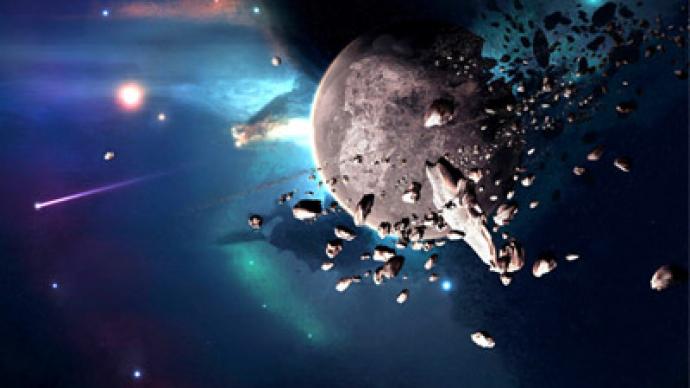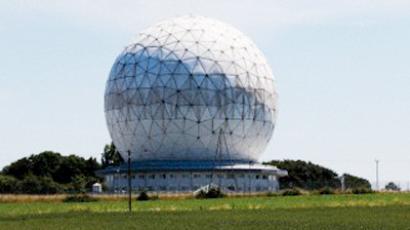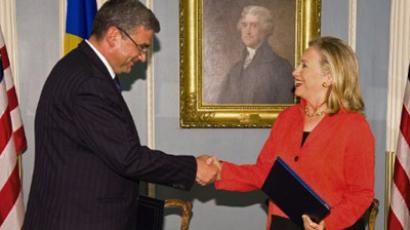‘Star Wars’ as alternative to missile defense

In a move to overcome the Russia-US deadlock over the missile defense, Moscow has reportedly come up with a new initiative: a global system to guard against missiles – as well as asteroids and other threats from space.
According to the plan, the system would be created jointly by Russia and NATO under the control of the United Nations, reports Kommersant newspaper. As one of five permanent members of the UN Security Council, Russia has the veto right and, therefore, would be able to influence the development of the project.The idea was put forward by Dmitry Rogozin, Moscow’s envoy to the security alliance, writes the daily, citing diplomatic sources.The package of proposals has yet to be formalized. The idea has been nicknamed “Strategic Defense of Earth” as an allusion to “The Strategic Defense Initiative’ – better known as “Star Wars” – suggested by former US President Ronald Reagan in 1983.The costly and highly-criticized plan for ground and space-based systems intended to make America invulnerable to nuclear attacks.The point of the Russian “Star Wars” initiative is to focus on fighting threats coming from space rather than just missiles. The Washington-backed missile defense shield is customized purely for countering missiles “launched somewhere in the Middle East,” a source told Kommersant. Moscow proposes a different approach. It would be an integration of anti-aircraft, missile and space defenses. “Thereby, the system… would be targeted against possible threats to Earth coming from space, including asteroids, comet fragments, and other alien bodies,” the source is cited as saying. The system should be capable of both monitoring the space and destroying any dangerous objects as they approach our planet. The plan mulled over in Moscow uses American logic – their habit of thinking globally. The missile defense idea that Washington currently sticks to does solve a global task: it saves the US and its allies from missile threats. “[The Russian] concept gives an opportunity to propose [the US] even a more global task – to save the world. And also do it together with us rather than on their own,” Kommersant’s informant noted. According to the paper, President Dmitry Medvedev showed interest in the proposals and instructed Dmitry Rogozin and presidential aide Sergey Prikhodko to work further on the initiative. However, no official confirmation or comments have followed so far.Last week, Washington made it clear that the negotiations with Moscow on the missile defense shield in Europe had reached a dead end. Michael McFaul – the recently-nominated US ambassador to Russia and a chief architect of the President Barack Obama's policy of "reset" of relations with the Kremlin – announced that the US had no plans to provide any legally-binding guarantees that the defense system would not be targeted against Russia. Moscow, though, continues to stand firm in its position. The Russian side wants the US to provide not only legal guarantees that there is no threat, but also the exact parameters this system may possess – the number of interceptor missiles, their location, speed and range. "All this must guarantee that the missile defense system in Europe will not weaken the Russian strategic potential. Moreover, the guarantees must be provided not only by the United States, but by NATO as a whole," Dmitry Rogozin told NTV channel on Tuesday, cites Interfax agency. "NATO, within the framework its joint responsibility, must say something to Russia too."The Russian envoy added that if the guarantees cannot be provided during Obama’s tenure, “they will be given under another administration.”A deployment of Iskander-M missile systems in Russia’s northwestern military district of Leningrad may become one of the arguments in the row, writes Izvestia newspaper. Following McFaul’s statement, Russia’s Defense Ministry announced of a creation of a first brigade that would entirely armed with Iskanders.Last week, Russian Foreign Minister Sergey Lavrov admitted that there was no movement in missile defense talks between Russia, the US and NATO. However, he expressed confidence that Russia was capable of defending its territory and international position. “In our development plans we have opportunities to secure our territory and our positions in the strategic stability sphere without serious additional expenditures,” the official said in an interview with Russia’s Profile magazine.The American plan to deploy elements of its defense system in Eastern Europe has been a bone of contention between the two powers ever since it was first announced by former US president George W. Bush. Russia has feared that the shield would pose a threat to its national security, while America kept assuring – in word only – that it is purely a protection against possible attacks from so-called rouge states.Despite the announced “reset” in the relations after President Obama came to office, Washington is going ahead with its plans.Last month, the US signed a deal with Turkey on the deployment of an American radar station in the in the southeastern Turkish province of Malatya by the end of the year. Also in September, Romania agreed to a deal with Washington under which land-based SM3 interceptor missiles and over 100 military personnel will be based on Romanian soil. On September 15, the Polish-American missile defense plan – first signed in 2008 – entered into force. Under the agreement, the US will deploy its SM-3 interceptors at Redzikowo Base in Poland.















